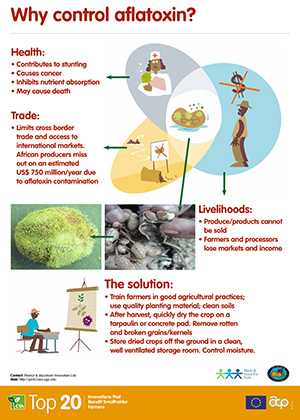PMIL Assistant Director helps develop international extension materials on aflatoxin control in smallholder peanut production
By Christy Fricks
University of Georgia, Peanut & Mycotoxin Innovation Lab
 Jamie Rhoads, Assistant Director of the USAID funded Peanut & Mycotoxin Innovation Lab (PMIL) housed at the University of Georgia’s College of Agricultural and Environmental Sciences, is participating in a writing workshop at the Technical Centre for Agricultural and Rural Cooperation’s (CTA) International Forum, October 13ththrough 17th 2014, in Arnhem, Netherlands. He is helping to finalize a poster, brochure and guidebook that will help smallholder farmers globally decrease aflatoxin contamination in peanuts.
Jamie Rhoads, Assistant Director of the USAID funded Peanut & Mycotoxin Innovation Lab (PMIL) housed at the University of Georgia’s College of Agricultural and Environmental Sciences, is participating in a writing workshop at the Technical Centre for Agricultural and Rural Cooperation’s (CTA) International Forum, October 13ththrough 17th 2014, in Arnhem, Netherlands. He is helping to finalize a poster, brochure and guidebook that will help smallholder farmers globally decrease aflatoxin contamination in peanuts.
The products being developed were selected as one of the 20 proposals awarded from 250 international applications to the CTA’s December 2013 call for proposals “to unearth and award top innovations that are transforming smallholder farms in Africa, the Caribbean and the Pacific.”
The original proposal was drafted and submitted by the former Director of Research and Extension at Meds & Food for Kids (MFK), Bryan Sobel, who is attending the CTA workshop as well.
MFK is a US-based NGO working in Haiti to produce a Ready-to-Use Therapeutic Food (RUTF), which has peanuts as a primary ingredient. MFK also provides training and markets for farmers while engaging in agricultural research and extension to improve crop yields and reduce aflatoxin.
“The thrust of this award is that it asks MFK to provide the information made available to Haitian farmers to smallholder farmers around the world concerning aflatoxin abatement methods,“ said MFK founder Patricia Wolff.
“The former Peanut CRSP and now PMIL have been working in Haiti with MFK for more than 5 years. In that time, a lot has been accomplished; aflatoxin levels have fallen, peanut yields and farmer incomes have increased,” Wolff said.
The 20 awardees are working with a team of marketing and publishing experts to hone the message of their materials for farmers and policy makers.
The completed materials will be published and distributed in Africa, the Caribbean and the Pacific, in both print and electronic form, by the CTA.
The ideas to be included in the final products are based on the work that Rhoads developed during his time as a former employee and consultant in Haiti for MFK.
“With MFK and the PMIL, we developed a suite of technologies that made it possible to evaluate and control aflatoxin at the smallholder farmers level, including in-field testing, better production practices, and better post-harvest handling,” said Rhoads.
“I hope that the publication will reach many audiences and that it will spread the knowledge that aflatoxin contamination can be controlled on a smallholder level,” said Rhoads.
Aflatoxin is a dangerous toxin produced by the molds in the genus Aspergillus. It affects peanuts and other crops that are harvested and stored in hot humid conditions.
Current methods of controlling aflatoxin involve infrastructure and inputs that are often too costly for smallholder farmers.
Globally, an estimated 2.5 billion people are involved in smallholder agriculture. These smallholders manage approximately 500 million small farms and provide over 80 per cent of the food consumed in large parts of the developing world.
More than 5 billion people worldwide are at risk of chronic exposure to aflatoxin through contaminated foods, according got a report published in Environmental Health Perspectives in 2006.
The CTA is a joint international institution of the African, Caribbean and Pacific (ACP) Group of States and the European Union (EU) that works to advance food and nutritional security.
Published October 16, 2014
